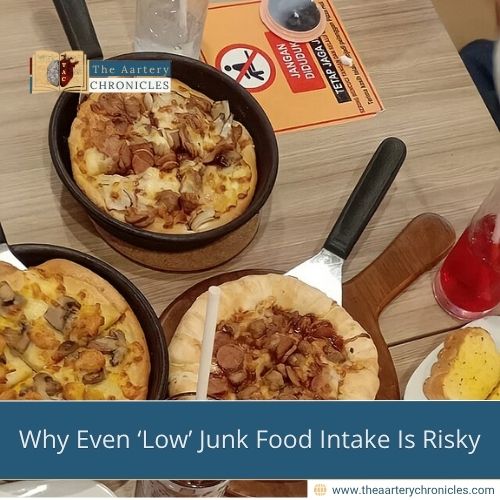

Why Even ‘Low’ Junk Food Intake Is Risky
A recent study warns that even moderate consumption of ultra-processed foods such as processed meats, sugary drinks, and trans fats can significantly increase the risk of serious long-term illnesses, including diabetes, heart disease, and cancer.
New Evidence from Global Research
In a comprehensive study published in Nature Medicine, researchers from the Institute for Health Metrics and Evaluation (IHME) at the University of Washington examined how regularly eating certain ultra-processed foods affects our health even in small quantities.
The study is among the first to systematically explore how different levels of consumption of these foods are linked with chronic diseases. The findings add weight to growing global health concerns over modern diets.
Small Intake, Significant Risk
The research showed that even a low daily intake of processed meat between 0.6 grams and 57 grams can raise the risk of type 2 diabetes by 11%, compared to those who avoid it entirely.
For colorectal cancer, the risk increased by 7% for people consuming as little as 0.78 grams to 55 grams daily.
Similarly, the risk of ischemic heart disease (IHD) a condition where the heart gets less blood due to narrowed arteries rose by 15% for those consuming 50 grams of processed meat per day.
Sugary Drinks Also Add to the Danger
The study also linked sugar-sweetened beverages (SSBs), such as sodas and energy drinks, with greater health risks:
- Drinking between 1.5 grams and 390 grams daily raised the risk of type 2 diabetes by 8%.
- An intake of up to 365 grams per day was associated with a 2% higher risk of developing ischemic heart disease.
These findings are especially concerning because they show that health risks begin to rise with even the smallest habitual consumption, typically equivalent to one serving or less per day.
What Makes These Foods Harmful?
According to the researchers, processed meats often contain harmful compounds formed during smoking, curing, or preservation. These include:
- N-nitroso compounds
- Polycyclic aromatic hydrocarbons (PAHs)
- Heterocyclic amines (HCAs)
These substances have been linked to tumour growth and are known carcinogens. Additionally, trans fatty acids (TFAs), often found in baked goods and fried snacks, are known to contribute to heart disease.
A Global Health Concern
The global burden of diseases linked to unhealthy diets is enormous. The study estimates that in 2021, diets high in processed meat contributed to nearly 300,000 deaths worldwide. Meanwhile, diets rich in sugar-sweetened beverages and trans fats were responsible for millions of disability-adjusted life years (DALYs) a measure of overall disease burden.
What the Experts Recommend
The study reinforces the urgent need for public health guidelines to:
- Reduce the consumption of ultra-processed foods, including processed meats, sugary drinks, and trans fats.
- Promote healthier food choices rich in whole grains, fresh produce, lean proteins, and healthy fats.
- Educate consumers on the risks associated with even occasional consumption of these harmful food items.
Conclusion
While occasional indulgence may seem harmless, this new research makes it clear: even small amounts of ultra-processed foods can add up to big health problems over time. It’s not just about what we eat in large quantities even minor, daily habits matter when it comes to long-term health.
Making informed food choices, reading labels, and opting for whole and minimally processed options can go a long way in protecting your health.
Source: Inputs from various media Sources

Priya Bairagi
Reviewed by Dr Aarti Nehra (MBBS, MMST)
I’m a pharmacist with a strong background in health sciences. I hold a BSc from Delhi University and a pharmacy degree from PDM University. I write articles and daily health news while interviewing doctors to bring you the latest insights. In my free time, you’ll find me at the gym or lost in a sci-fi novel.








